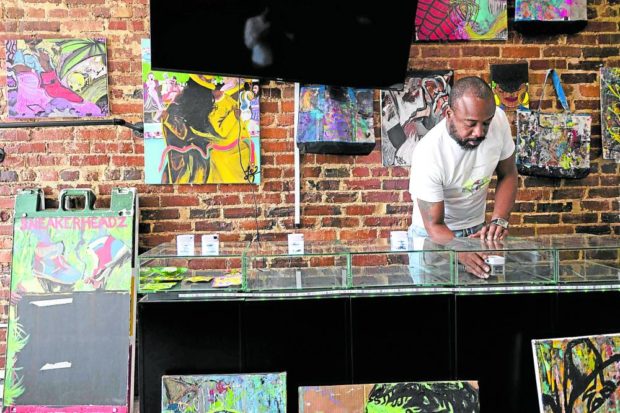To skirt ban, sellers offer ‘free weed with purchase’

Forest Hayward organizes marijuana and other cannabis at his store the Sneaker Headz on April 15 in Washington, DC. AFP
WASHINGTON — Buy a T-shirt, get a “gift” of weed: that’s how some stores operate in Washington, exploiting a perceived loophole to sidestep a ban on selling cannabis in the US capital.
The situation is but one example of the hazy legality surrounding marijuana in America, despite a trend in recent years toward normalization.
“Business is great!” declares Forest “Ty” Hayward, 41, the proud co-owner of Sneaker Headz — one of several “gifting shops” that have sprung up in a city now known for the everpresent fragrance of the flower.
Many are African-American owned, and are seeing a lively trade ahead of national marijuana day on April 20. Hayward sees his work as “a turning point for the Black community,” which historically suffered a disproportionate rate of cannabis convictions.
‘Presents’
Since 2014, Washington residents have been allowed to possess paraphernalia and two ounces of weed, gift some to others, use it on private property, and grow up to six plants. But Congress—which approves the city’s budget—has barred legal sales.
Article continues after this advertisementInstead stores sell items like T-shirts and stickers, starting at around $30, with which customers also receive “presents” in the form of weed buds or gummies.
Article continues after this advertisementCannabis was first outlawed at the federal level in 1937, “largely along racial reasoning, as well as to keep out immigrant workers or find ways to criminalize them,” Morgan Fox, political director of advocacy group NORML, told Agence France-Presse (AFP).
The 1970s brought the “War on Drugs,” which likewise disproportionately hit minorities —before the medical marijuana movement took root in the 1990s, and in 2012 the first states made recreational cannabis legal for adults.
Today, 18 of the 50 US states plus Washington have legalized recreational weed use, while 37 have medical cannabis laws on the books.
But since the drug remains a controlled substance at the national level, everyone involved is still technically breaking the law of the land.
The ban makes it difficult to access banking services, stops federal funding for medical marijuana research, prevents interstate commerce, and federal regulation on best practices and protocols for marijuana.
What’s more, a future presidential administration unsympathetic to legalization could go after businesses and consumers even in states where the plant is legal.
RELATED STORY
US pot use increasingly normal, but legality is hazy
Mississippi becomes 37th US state to legalize medical marijuana
‘High demand’ as Nevada becomes latest US state to legalize marijuana